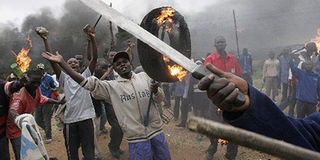Robust witness protection unit key to PEV cases-group

A group of youths brandish crude weapons during protests in Nairobi December 31, 2007 following the announcement of the disputed results of the general elections. Lack of an operational witness protection unit is the greatest obstacle to resolving cases of police killings related to the 2008 post-election violence, a new report suggested December 09, 2011. FILE
Lack of an operational witness protection unit is the greatest obstacle to resolving cases of police killings related to the 2008 post-election violence, a new report suggests.
The report released Friday by the New York-based Human Rights Watch says that a large number of witnesses are afraid of testifying for fear of being attacked. It further says that Parliament should move to ensure that a “special mechanism” is established to deal with the cases that have not been handled.
The report says that the Witness Protection Agency will have to prove itself before many election violence witnesses are willing to testify in court adding that its activation should be an urgent priority.
The report is calling on the government to urgently provide full funding to the existing Witness Protection Agency and ensure that it is “robust, credible, and has the option of relocating at-risk, high value witnesses outside Kenya".
“In Kisumu, the father of two victims of police shootings told Human Rights Watch that while he would be willing to testify, “Others would be afraid to come and testify because they are afraid they could be killed,” the report says.
In another account, a local government official in Kisumu whose brother was killed by police told the NGO that although he would be willing to testify before a special mechanism, he would fear the consequences.
“If you’re a civil servant you’re not supposed to accuse the government of anything. The following day you might get a letter and be told that you’ve been sacked,” the report quotes the official as saying.
The report is also calling on the international community to consider offering support, including training, human resources support, and financing, on the condition that the mechanism is credible, independent, and capable of protecting witnesses.
The report comes just over a month before the country knows the verdict of a case involving former police commissioner Hussein Ali at the International Criminal Court. The post-master general is accused of having instructed the police not to interfere with the criminal gang Mungiki at the height of the chaos.
ICC prosecutor Luis Moreno-Ocampo is also alleging that the officers under his watch had a shoot to kill order which left close to 400 people dead.
The HRW report says that many Kenyans question the agency’s ability to adequately protect witnesses at all, given the history of attacks on witnesses that are attributed to the police who ought to play a role in protecting them.
“The police commissioner sits on the agency’s board; while the board need not be privy to sensitive information held by the agency, one civil society activist questioned the wisdom of any role for the police commissioner in witness protection, given the number of cases likely to arise involving police as perpetrators,” the report says.
One Kenyan activist, the 99-page report says, told Human Rights Watch that the ICC is “the first institution Kenyan politicians have come across that they cannot bribe, kill, or intimidate,” making it the focus of many victims’ hope for justice.
The report also says that on the government should urgently increase funding to the office of the Director of Public Prosecutions to enable it handle pending post-election violence cases.
The said that prosecution on most of the cases has stalled due to the lack of capacity in the DPP’s office. It is asking the government to recruit an additional 400 prosecutors as a way of boosting the DPP’s capacity.
This, it says, will not only help solve the post-election violence cases but will also aid in future prosecutions of various cases in the country.




